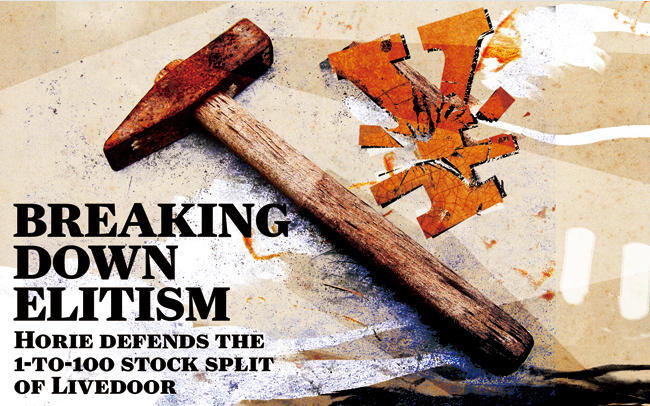The financial market spotlight fell on my old company Livedoor when I split the company’s stocks by 100. That’s basically when public criticism of me really began to build.
At that time, Waseda University’s Tatsuo Uemura and Michio Matsui, President of Matsui Securities, were the most open critics of mine. In some cases, I don’t think I argued against much of the criticism. I used to think that it was a really adult approach to just let the ones who didn’t know what they were talking about talk.
But it was a mistake. Unless you properly explain (your intentions), the people who criticize you will continue to do so and before you know it, you’ll be vilified.
At that time, completely unrelated to the 1-to-100 stock split, the Livedoor “incident” happened, and along with the stock split, I was further labeled as a villain.
Well, the case is still on trial so I’ll talk about this in more detail on another occasion. But for now, I want to explain why a 1-to-100 stock split is a totally fine way of doing things.
In the stock market at the time, the stock split was operated in a way that was hard for an amateur like me to understand. On the day of the stock split, for a time, there will be less shares in circulation, and then, two months later (I think?), new shares will arrive. Therefore, for a temporary amount of time there will be an extreme decrease in the number of circulating shares and the share price volatility will increase. However, that is only a temporary thing and once the new shares arrive, share stock prices will return to their original level. If you think that this would be good for acquisition of a company by way of stock swaps, that’s not exactly the case. Shares of the stock exchange by way of a stock split are calculated by using techniques measuring the weighted average of the past three months, so the period where there is an increase in volatility after the day you split the stock is not taken into account in the first place. If there are people who say they can profit from a 1-to-100 stock split, that is a huge error. They are taking advantage of people who have no knowledge on the matter by ridiculing myself and Livedoor.
In the end, because we did the 1-to-100 stock split, this illogical investment changed into being a rational investment. If you don’t do these kinds of things, conservative organizations will continue with their illogical investments—that is their uselessness.
Just because you say it is wrong doesn’t mean that anything will change. It’s shameful to think that in such an IT-advanced country as this, a stupid thing like the new stocks not arriving for another two months had been widely practiced in Japan until only a couple of years ago, I feel.
By the way, the critics of the 1-to-100 stock split keep arguing the point about the increased volatility in share prices. But actually, the beauty of this kind of split is elsewhere.
Since the arrival of online brokerage companies, trading commissions have significantly decreased. They may not even charge for every fixed rate transaction. This is the beauty of the Internet, and it has changed how, in the past, vast sums of wasted expenditure was spent on the fees of sales people and administrative costs -- these are the great achievements of Mr. Matsui and Mr. Kitao.
So, I thought I would maximize this amazing system for Internet broking and use it to allow anyone to have a hand in stock trading. That significantly reduces the acquisition cost of each share. I listed the shares in our company, and learned a lot about the stock market. And the truth, which I learned, was shocking. The majority of companies only allow stocks to be traded if they are worth close to a million yen or more. In other words, ordinary people were not allowed to trade stocks. People may say “don’t look down on common people. If it were 500,000 yen or 1,000,000 yen, they could buy it!” But even if they could afford it, it would just be one or two shares. Imagine the shock if you bought a stock for 1,000,000 yen and it dropped to 800,000 yen. And then they find that the stock reduces to 100,000 or 200,000 yen. And without knowing what to do, are in tears as they are forced to sell.
What if one share cost 500 yen? 10 shares would cost 5,000 yen. Even if it dropped by 10 percent, that’s still 4,500 yen. They could cut their losses or cut at least part of their losses anyway. In addition, if they hold 10 stocks in 10 companies, it would still only cost 50,000 yen. You could create a portfolio of stocks. Even if you made huge losses from one company’s stock, the chances of you being able to cover the losses with other companies’ stocks increases. Furthermore, thanks to Internet brokerages, the handling charge is cheap. That’s why, even with this [stock] denomination, there is the possibility of really increasing your profits.
You can further increase the liquidity of the market by lowering the unit [share] price. And that will lead to more participants as well. The reason why Livedoor’s shares were popular at the time is because we did this kind of thing earlier than other companies. Companies where not even one share would yield anything were sitting idle, particularly on the JASDAQ. Can you call a stock like that a listed stock?
Stock markets do not belong to a small group of rich people. It’s a public institution for everyone. More companies should split their stocks by 100, or tens, and decrease the investment denomination to invite more contributors. I wanted to then create a healthy stock market that had the support of a large amount of shareholders. That’s why I really regret the fact that Livedoor had to de-list. Although I assert in my book that I did not window dress, even if I was found guilty of embellishment, I do not think that [Livedoor] should have de-listed from the market. Unlike what the media say, it was not a company with no substance (it seems to be doing well even now), and it’s not like we’re like Seibu Railway, who lied about the number of shareholders. As a listed company, it should have been sufficiently full equipped.
Of course, I understand that there are those who feel uncomfortable or say unpleasant things about what I say now. However, I’d like to respond to things that have been said against me. Because I am forced to say that each and everything like this counts towards my trial.
P.S. During the 1-to-100 stock split, which I dubbed ‘investomer,’ (This is a term Horie himself came up with which is a mix of "investor" and "customer": Ed) we were actually planning for things like dividends to go through the Internet bank that we were planning to incorporate, with zero handling fees. As they would open an account with us, it was like killing two birds with one stone. With the electronic stock certifications in the works, as well as the ability to receive through securities accounts, if Livedoor securities could accept dividends then there wouldn’t be a handling charge.
Of course, there would be people who would want to receive dividend payments in the same way they used to. For those people, we would have to mail it to them, as we would have to mail them the notification of a shareholders meeting report, and the most of the postage costs were already covering the sending of a business magazine and advertisement pamphlets. So the cost of sending dividends was of course possible.
Originally posted on http://ameblo.jp/takapon-jp
English translations of the blog will appear regularly on www.japaninc.com
Subscribe to our RSS feed or follow us on Twitter for updates
Blog:
Other posts by Takafumi Horie:








Comments
Anonymous (not verified)
March 25, 2009 - 18:27
Permalink
Horie for Prime Minister
There is a large part of me that would like to see this guy in Aso's chair at the helm of the Japanese economy. He couldn't possibly be any worse and perhaps with a pair of Livedoor sized forward thinking economic testicles, someone like Horie might even be able to spark some life into this economy before the we spiral into cost cutting oblivion.
Well done Japan Inc for getting this guy on board. I'm looking forward to reading more from the Horiemon.
Anonymous (not verified)
March 27, 2009 - 13:29
Permalink
Horie for Prime Minister
Damn straight. I'd vote for Horie if I could. Japan need plenty more mavericks like him. In fact, I'll put money on his book and visit him if he gets sent to the musho by Japan's law enforcement.
Good looking out Horie-san.
mameha (not verified)
March 28, 2009 - 21:27
Permalink
the nail that sticks up...
I havent made my mind up about this guy as I still do not know much about him and Livedoor, however I intend to follow his blog on here to find out more.
From what I gather he has a lot of new ideas and wants to shake up the corrupt old boys club, but has become just another nail that got hammered down (for now).
I hope his writing gets a little clearer a future!!!
Anonymous Split... (not verified)
March 29, 2009 - 14:42
Permalink
http://hbswk.hbs.edu/item/520
http://hbswk.hbs.edu/item/5200.html
"Q: What do you think Livedoor's legacy will be?
A: It is possible that Livedoor will be remembered as just a fraud. And to some extent, this is well deserved. However, I think Horie deserves some credit. Although he may not have been good at operations, he had a deep understanding of financial markets and a perception of what investors wanted to hear. In some sense, he figured out that selling stock to investors was much easier than selling product to customers. But more importantly, he revitalized Japan's sleepy market for corporate control. In the attempt to acquire Nippon Broadcasting Systems, Livedoor drew attention to the cronyism that governs Japan's corporate world."
skyscraper (not verified)
March 30, 2009 - 14:58
Permalink
Best comment so far!
Well said! I would consider voting for Horie too - if I could! When will they pass the law for passing the vote for foreign residents....
>He couldn't possibly be any worse and perhaps with a pair of Livedoor sized forward thinking economic testicles, someone like Horie might even be able to spark some life into this economy before the we spiral into cost cutting oblivion.